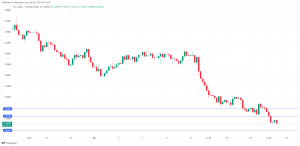Economics
Canadians need a taxpayer bill of rights
Taxpayer Bill of Rights offers a solution to Canada’s perpetual spending crisis Ottawa has a spending problem, with a worrisome deficit and a debt…


Taxpayer Bill of Rights offers a solution to Canada’s perpetual spending crisis
Ottawa has a spending problem, with a worrisome deficit and a debt service problem. Canada’s federal debt is about $1.2 trillion – roughly $30,000 per person, over $60,000 per household. Even worse, the debt is growing, with the current Liberal regime forecasting a fiscal 2023 $40.1 billion deficit.
The Trudeau government projects annual deficits will keep growing, but not as quickly as in the past three years. It should be noted that federal annual debt servicing costs, assuming bond yields are about three per cent, will be over $36 billion per annum. If Ottawa had no debt problem, with annual government spending deficits near zero, bond yields would fall, and taxpayers would enjoy lower taxes.
Canadian taxpayers should be frustrated at being bystanders, ignored as their children’s and grandchildren’s posterity is turned into debt poverty and stagnation. Other places in the world have managed to contain their politicians’ boundless ambitions and extravagant spending.
One such place is the U.S. state of Colorado. In 1992, thanks to low-tax free market-oriented advocacy groups, voters enacted the Taxpayer Bill of Rights (TABOR), now part of the Colorado Constitution: tax revenues cannot grow faster than inflation plus the state’s population growth rate. Any surplus state revenue must also be returned to Colorado taxpayers directly or via tax cuts.
In general, U.S. states cannot carry permanent debt ( ‘fudge factor’: pension plan funding). Hence, paying down debt is not as relevant there. Contrary to U.S. states, Canadian provinces and the federal government carry substantial debts, seemingly perpetually.
In principle, applying a TABOR law in Canada could work. Manitoba’s 1995 Balanced Budget Law required referendums on major tax increases and penalized cabinet ministers with salary reductions for deficit spending. It was quietly emasculated, of course, by the NDP after 1999.
Today, Saskatchewan pays down debt with its surpluses using a revised formula that splits any after-expenses net revenue – which could be called ‘profit’ in the private sector, a word anathema to those who love government and its money-squandering. The ‘surplus’ allocation: debt reduction, limited increases in program spending, and tax reductions (sales tax and personal and corporate income taxes). Encouragingly, in Alberta, the UCP has proposed expanding the existing Taxpayer Protection Act to include requiring a voter referendum on new income tax hikes or enacting a provincial sales tax.
The alternative is a continuation of the dysfunctional fiscal policies that Canadian provinces have followed – obliviously and irresponsibly assuming the role of hapless victims of economic gyrations or other ‘shocks’. For example (in the 1990s), when Alberta suffered through a low energy price period, the government adopted quasi-Draconian cost cuts. Then, when the oil price recovered, and spending was reset lower, all debt was repaid; in the new millennium, the province prospered. Unfortunately, Alberta’s provincial government then returned to its free-spending ways, and when oil prices dropped in 2008 and 2014, budget deficits returned.
Quebec is now Canada’s solid fiscal ‘citizen’, gradually lowering corporate income tax rates and improving its competitiveness, although it requires substantial help (10 per cent of its fiscal 2023 revenue) from federally-mandated equalization payments. British Columbia and Saskatchewan are ‘nearly responsible’; the other provinces less so.
Canadian politicians, federal, provincial, and municipal, are proven spendthrifts: TABOR, in particular its most powerful feature – legislated spending limits – would bring about some sanity and discipline.
By Ian Madsen
Ian Madsen is the Senior Policy Analyst at the Frontier Centre for Public Policy.
Troy Media

Argentina Is One of the Most Regulated Countries in the World
In the coming days and weeks, we can expect further, far‐reaching reform proposals that will go through the Argentine congress.
Crypto, Crude, & Crap Stocks Rally As Yield Curve Steepens, Rate-Cut Hopes Soar
Crypto, Crude, & Crap Stocks Rally As Yield Curve Steepens, Rate-Cut Hopes Soar
A weird week of macro data – strong jobless claims but…
Fed Pivot: A Blend of Confidence and Folly
Fed Pivot: Charting a New Course in Economic Strategy Dec 22, 2023 Introduction In the dynamic world of economics, the Federal Reserve, the central bank…



















